Sectarian strife: Protestant versus Catholic in 1930s Queensland politics
By JOL Admin | 24 March 2017
Guest blogger: Dr Lorann Downer, 2016 John Oxley Library Fellow.
Sectarian or religious division is a major theme in the political ephemera held in the John Oxley Library collections from the 1938 Queensland election. Ephemera, such as pamphlets and how to vote cards, help tell the story of the political history of our state. In this instance, they tell a story that we don’t hear much today. Sectarianism is no longer a burning political issue but eight decades ago it aroused great passion.
As the John Oxley Library Research Fellow for 2016, I am reviewing the Library’s original collections of political ephemera. The collection for 1938 is one of the richest I’ve found so far. Among the pieces are 15 pamphlets that relate to the Protestant Labour Party, which was formed in 1937 in response to concerns about the perceived disproportionate influence of Catholics within the Australia Labor Party.
The collections contain three pieces from Protestant Labour. The first is a four-page pamphlet which carries a policy speech by Party President, George Webb, on 10 March, 1938. Webb’s message is unashamedly sectarian, in keeping with the origins of his party. After claiming Protestants need to be “active politically to prevent Romanism from dominating this country”, Webb says Roman Catholics outnumber Protestants in various public service and judicial positions and among Labor Members of Parliament. Webb attacks Labor policies that he claims favour Catholic churches, schools and teachers. He makes pledges in a number of policy areas beginning with impartiality in government appointments. Webb concludes with a call for support from Protestants for the party generally, and specifically for Richard Vane-Millbank, the candidate in the Brisbane bayside seat of Sandgate. Webb himself stood against Labor Minister and future Premier, Ned Hanlon, in the Brisbane seat of Ithaca. The second piece from the Protestant Labour Party is a four-page pamphlet dedicated to promoting Vane-Millbank in Sandgate. Again, the piece is overtly sectarian. The first page features an Australian flag in full colour and a headshot of Vane-Millbank, with the text: “The Price of Liberty is Eternal Vigilance - - When Queensland ceases to be Protestant, she ceases to be free”. The third piece is a leaflet from the Protestant Labour Party candidate for the Brisbane seat of Buranda, J. H. Webster, who is making a final appeal to voters. Webster reprises the claims that Roman Catholics outnumber Protestants in various public service positions and amongst Labor MPs, adding that Protestants make up 92 out of every 100 so-called relief men who work for unemployment payments. Voters are urged: “DON’T GIVE YOUR BIRTHRIGHT AWAY. VOTE PROTESTANT LABOUR-PROTESTANTISM FIRST, LABOUR SECOND.”
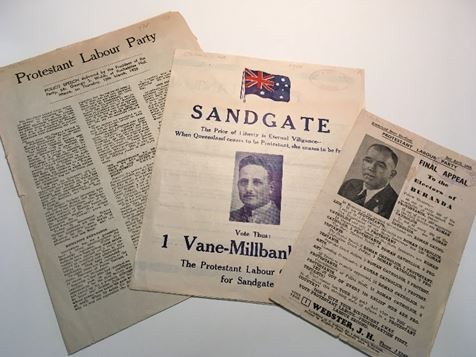
SLQ political ephemera collection
The Labor Party, in response, seeks to discredit the “sectarian mongers” of the Protestant Labour Party. From the pieces in the Library’s collection, I have selected four Labor pamphlets. The first starts with the same slogan as Vane-Millbank’s pamphlet - “The Price of Liberty is Eternal Vigilance” - but finishes with the warning “Beware of the Sectarian Devil”. Below is a graphic of an armed, masked man, labelled both ‘Prod. Lab. Party’ and ‘Anti-Labor Party’, who is slipping a poison letter into a letterbox. The second piece depicts a ‘Sectarian devil’ wading through ‘Sectarian filth’. It asks voters to consider what they know about the people in “the so-called Protestant Labour Party”. The third piece reprises the graphic of the masked man and attempts to tie Labor’s conservative opponents - the United Australia Party and the Country Party - to the Protestant Labour Party. It claims the United Australia and Country parties have never opposed the Protestant Labor Party and that the three are in league against Labor. The fourth piece is from Premier William Forgan Smith who does not name the Protestant Labor Party but attacks an “insidious campaign of old world hates”. He pledges Labor to freedom of thought, speech and organisation.
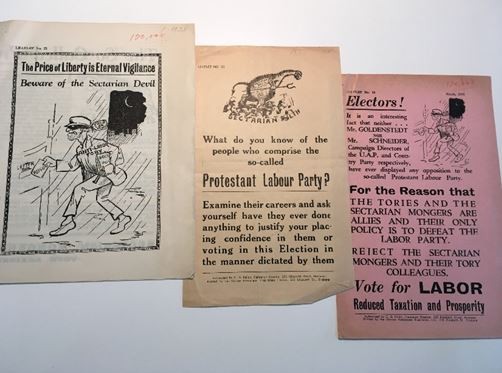
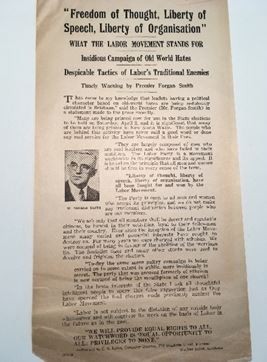
SLQ political ephemera collection
The Communist Party responds to the emergence of Protestant Labour with more complex arguments. The Library’s collections hold two relevant pieces from the Queensland District Committee of the Communist Party. The first is a four-page policy manifesto addressed to the electors of Queensland and featuring a headshot of the Queensland party leader, Jack Henry. Under the sub-heading, “Clean up the monster of sectarian strife”, is a call for a public inquiry into claims of sectarian preference in the public service. The piece concludes by urging voters to elect a Labor government “strengthened by Communist members”. The second piece is a four-page pamphlet which argues the Protestant Labour Party was formed by enemies of the labour movement capitalising on “the weaknesses resulting from the policy of the right-wing leaders of the Labor Party and playing upon religious prejudices”. It urges workers to “renounce sectarian splitters of every brand” but also calls for an inquiry into accusations, unspecified, being made by the Protestant Labour Party against Labor’s leaders.
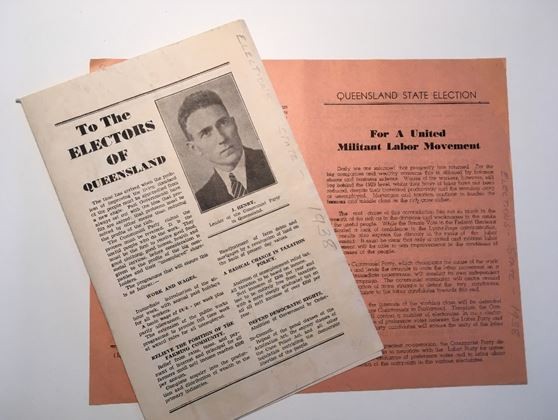
SLQ political ephemera collection
Religious leaders also join the debate. One small pamphlet, authorised by the Queensland Council of Churches, carries two letters which were published in The Courier-Mail newspaper. The first is from Catholic Archbishop of Brisbane, James Duhig. He denies claims that the church has “undue influence” on the Labor Government and attempts to influence how Catholics vote, and that Catholics are given preference for public service positions. The second letter is a response from President of the Queensland Council of Churches, Norman Millar. He points to the “incompatibility” of the theories of Papal sovereignty and of sovereignty of a democratic state. He is critical of state funding for “sectarian education” and rejects Duhig’s claims of non-interference in politics and the public service. Another piece, titled “Mixing The Things of God and Caesar”, is attributed to Reverend Robert Bousfield, a Minister of the Presbyterian Church in Australia. Decrying the use of “the Sectarian issue”, Bousfield speaks of his regret that some Protestants are failing to separate church and state and urges people to vote on “deeds not creeds”. The Protestant Labour Party, although not named, is obviously the target of this piece. Interestingly, the bottom of the piece carries Labor’s campaign slogan, ‘Keep On With the Good Work. Vote LABOR’, and an authorisation by Labor’s Campaign Director, Clarrie Fallon.
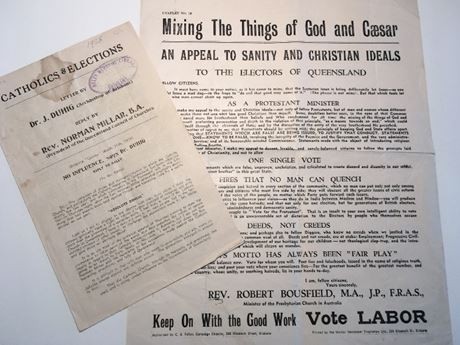
SLQ political ephemera collection
Labor did have some cause for concern about the Protestant Labour Party, in the hard-fought and bitter election campaign of 1938. Protestant Labour stood candidates in 23 of the 62 seats that existed at the time. Moreover, optional preferential voting was in use, meaning people could vote for Protestant Labour and choose not to allocate further preferences thereby denying sometimes vital second preference votes to the major parties. Protestant Labour won the fourth highest share, 8.75%, of first preference votes behind the Labor, Country and United Australia parties. In Ithaca, Hanlon defeated Webb by just 456 votes, and had to fight an appeal by Webb. In the end, Labor lost only the seat of Kelvin Grove to the Protestant Labour Party candidate, George Morris. The sole Protestant Labour Party Member of the Queensland Parliament, Morris was defeated at the 1941 election.
In 1941, Protestant Labour stood candidates in just three seats and its first preference vote share slipped to seventh place at 1.74%. The party faded away as would much of the sectarian division that had been its raison d’etre. But the ephemera that was left behind provide a portal back to a time when religion roused great emotion and discord in Queensland politics.
*Thanks to Simon Kelly for sharing his knowledge of the intricacies of minor parties in Queensland.
Further articles by Dr Lorann Downer
2017 John Oxley Library FellowshipThe John Oxley Library Fellowship is awarded annually to support a research project that uses the rich resources of SLQ’s John Oxley Library and contributes to the creation of new knowledge of Queensland.
Applications for the 2017 John Oxley Library Fellowship is now open.
The successful applicant will receive a stipend of $20,000 along with a personal work space within the John Oxley Library’s Neil Roberts Research Lounge for 12 months giving premium access the extensive collections and expert library staff and advice.
Comments
Your email address will not be published.
We welcome relevant, respectful comments.